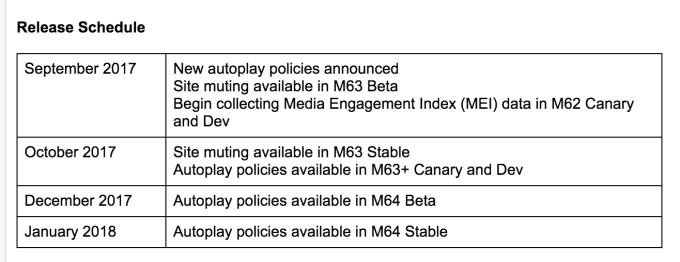| Image Source: Google |
One of the most distracting and annoying things about the internet today – besides all pop-up ads, of course – is viewing a site and getting blasted by an auto-play video. It not only annoy and surprise the web users, it also definitely leads to power and data consumption – which is of utmost concern for mobile users, especially. Google now says it will help find a solution to this rampant problem. In the expected updated version of the Google Chrome web browser (Chrome 64), Google will limit the capability of auto-play videos on websites.
As the company describes in a blog post, auto-play will only be allowed when the media doesn’t involve audio files, or when the user has indicated an interest in the media. In that latter part, user interest can be established by different situations. For example: if the user has recently or frequently playes the media on the site earlier when visiting from the browser; if they’ve clicked on the screen during the surfing session; or if they’ve added the site to their home screen on mobile devices.
Then again, Google is disabling some of its protections against auto-play for mobile users. On the Android Chrome, it’s removing the ‘block auto-play’ setting that’s currently available, and it will also remove auto-play blocking on mobile when the Data Saver mode is activated.
Google states that, by doing so, it will make this new “muted auto-play” more efficient. It may mean that if you’ve already taken a specific action to disable auto-play videos on mobile, you might actually see them play more often due to the changes if you’re not careful.
However, there will be some help on that part. In addition to the improvements coming to Chrome 64, Google will also introduce a new user option within Chrome 63 that will allow you to permanently restrict audio for individual sites. That is, if you have a favorite site that you like the content, but that’s abusing auto-play, video – perhaps a TV site or one with informative reviews – you can simply put it to mute indefinitely.
Google notes that the settings will remain active even when you close your browser and later return.
 |
| Image Source: Tech Crunch |
Site muting will arrive in the stable version of Chrome 63 in October, whilst the new auto-play policies will arrive in Chrome 64 (beta build) in December, and then to the stable build of Chrome 64 in January 2018.
Auto-play video is not the only internet annoyance Google plans to address in the near future. The company has already been developing a native ad blocker for Chrome, which popped up in the Android developer build earlier this summer.
That feature will choose the ads to block based on guidelines from the industry group, Coalition for Better Ads. It will include blocking ads like repeated pop-ups or those that prevent you from seeing content until a countdown timer completes, among other things. This ad filter is also set to arrive sometime in 2018.

